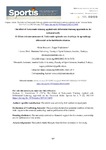The effect of Taekwondo training applied with differential learning approach on the technical skills

Use este enlace para citar
http://hdl.handle.net/2183/33063
Excepto si se señala otra cosa, la licencia del ítem se describe como Attribution-NonCommercial-ShareAlike 4.0 International (CC BY-NC-SA 4.0)
Colecciones
Metadatos
Mostrar el registro completo del ítemTítulo
The effect of Taekwondo training applied with differential learning approach on the technical skillsTítulo(s) alternativo(s)
El efecto del entrenamiento de taekwondo aplicado con el enfoque de aprendizaje diferencial en las habilidades técnicasFecha
2023-05-01Cita bibliográfica
Bozkurt, S.; Yesilcimen, T. (2023). The Effect of Taekwondo Training Applied with Differential Learning Approach on the Technical Skills. Sportis Sci J, 9 (2), 302-319 https://doi.org/10.17979/sportis.2023.9.2.9455
Resumen
[Abstract] Alongside the fact that the classical learning method has been used for many years in the area
of sports such as tae-kwon-do, there have been searches and attempts for unconventional
approaches to teaching. One of these is the differential learning approach, it is important the repetitions vary in the differential learning approach and that the attention is given to the basis of the technique rather than the perfect execution of the move. Examining the literature, no study has been found which investigates the outcomes of the taekwondo training program applied with a differential learning approach despite the fact that other branches have supported the positive contribution of the differential learning approach in the literature. The aim of this research is to examine the effect of differential learning on the technical skill
development of male and female taekwondo players with red-black belts in the 12-14 age group. A total of 16 taekwondo players, who have a red-black belt in the 12-14 age group star category and have a license of at least three years, participated in the research. In this quantitative research, the pre-test and post-test study group models (within quasi-experimental design) was used. Wilcoxon Test was used to examine the pre-test and post-test between the test values of taekwondo players. When the findings were examined, the differential learning approach has a positive effect on the technical skill development of the
female and male taekwondo athletes. [Resumen] Junto al hecho de que el método de aprendizaje clásico se ha utilizado durante muchos años en el ámbito de deportes como el taekwondo, ha habido búsquedas e intentos de enfoques de enseñanza no convencionales. Uno de ellos es el enfoque de aprendizaje diferencial. En el enfoque de aprendizaje diferencial es importante que las repeticiones varíen y que se preste atención a la base de la técnica más que a la ejecución perfecta del movimiento. Examinando la literatura, no se ha encontrado ningún estudio que investigue los resultados del programa de entrenamiento de taekwondo aplicado con un enfoque de aprendizaje diferencial, a pesar de que la contribución positiva del enfoque de aprendizaje diferencial en la literatura ha sido apoyada por otras ramas. El propósito del estudio fue investigar el efecto del entrenamiento de taekwondo aplicado con un enfoque de aprendizaje diferencial sobre las habilidades técnicas de los taekwondistas de categoría estrella de 12-14 años. Participaron en la investigación un total de 16 taekwondistas con cinturón rojo-negro de la categoría estrella de 12-14 años y con una licencia de al menos 3 años. En esta investigación cuantitativa, se utilizó un método de investigación semi experimental sobre el terreno con un grupo de estudio que incluía los modelos pre-test y post-test. La Prueba de Wilcoxon se utilizó para examinar las diferencias entre la prueba previa y posterior los valores de prueba los jugadores de taekwondo.Cuando se examinaron los hallazgos, se ha determinado que el enfoque de aprendizaje diferencial tiene un efecto positivo en el desarrollo de las habilidades técnicas de los atletas de taekwondo.
Palabras clave
Differential learning
Taekwondo
Training
Technical skill
Non-linear learning approach
Aprendizaje diferencial
Entrenamiento
Habilidades técnicas
Enfoque de aprendizaje no lineal
Taekwondo
Training
Technical skill
Non-linear learning approach
Aprendizaje diferencial
Entrenamiento
Habilidades técnicas
Enfoque de aprendizaje no lineal
Versión del editor
Derechos
Attribution-NonCommercial-ShareAlike 4.0 International (CC BY-NC-SA 4.0)






